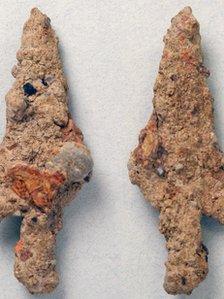Source - http://www.bbc.co.uk/news/uk-wales-mid-wales-25878701

The iron arrowheads date back to the medieval period
Part of a dolphin skull and a medieval arrowhead are among more than 9,500 artefacts uncovered by an archaeological dig at Cardigan Castle.
The 18-month project to uncover the 800-year history of the site has been conducted by NPS Archaeology.
Excavation work has also revealed a new part of the original castle which dates back to the 1170s.
It is part of an £11m renovation project which aims to re-open part of the site this year.
NPS Archaeology project manager Nigel Page said the dig had recovered more than 9,500 objects ranging from medieval pottery and animal bones to a NAAFI (Navy, Army and Air Force Institute) mug from World War II.
"They give a small window on the people who have lived and worked at the castle," he said.
'Exciting discovery'
The building is regarded as the first stone castle built by the Welsh princes and was the stronghold of Rhys ap Gruffydd, prince of the medieval kingdom of Deheubarth.
It is also said to have hosted what is regarded to be Wales' first eisteddfod, but for years it stood crumbling at the riverside gateway to the town centre.

The stone structure was part of the original castle
"The most exciting discovery is a three square metre stone structure made from pitch stone which dates back to the earliest stone castle which was built in 1171.
"It was a completely unexpected discovery lying just below the soil in the castle's garden."
Mr Page said the dolphin's skull also dated back to the medieval period before the 15th Century.
"It is not uncommon to find dolphin remains in castles near the coast because they would have been eaten by people at medieval feasts along with swans and other large animals," he added.
Cardigan Castle had a turbulent early history and was captured and lost several times by Llywelyn the Great before it returned to Norman hands after his death in 1240.
"Interestingly the rusted remains of a medieval iron arrowhead is the only evidence for warfare found during the works other than the thick castle walls," said Mr Page.
For the past 15 years the Cadwgan Building Preservation Trust has campaigned to save the site and it still needs to raise over £20,000 by 2015 to ensure the project can be completed.

Cardigan Castle's £11m renovation project started in February 2013
When work on the castle is finished it will have educational facilities, including for Welsh language, cultural, environmental and horticultural studies.
There will also be luxury accommodation for hire, a restaurant and an eisteddfod garden.
The aim is to increase visitor numbers from 3,000 to 30,000 a year.
The project has received funding from the lottery and the European Regional Development Fund, through the Welsh government, along with other organisations.